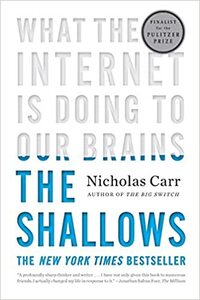Take a photo of a barcode or cover
informative
medium-paced
The Shallows is an incisive exploration of how the internet has, and continues to, change the way we think. It begins by giving a few historical examples of similar technologies that create unique "intellectual ethic" and illustrating how those paradigm-shifting inventions affected human thought. Then it proceeds into a much deeper dive the internet in particular; from some of the fundamental technologies and ideas behind computing to some of the philosophies that drove Google to become what it is. It's written in a very accessible manner, with very few exceptions where some of the detail goes beyond what a layman can reasonably comprehend, and I appreciated the logical approach and organization of the narrative. Even 15 years after its publishing, The Shallows is still as poignant as it would have been when it was written, if not more so. If you're remotely interested in how technological trends can literally change how we think, look no further.
medium-paced
Woooooooowwwww, already knew how bad this constant information barrage was but this book broke it down quite well.
challenging
informative
reflective
medium-paced
Me realizing that this was published in 2010 and every observation has had nearly 15 years to accelerate exponentially, like the protagonist in a horror movie realizing the killer has been under their nose the whole time
informative
inspiring
reflective
slow-paced
Reading this now makes it a bit dated (multiple references to blackberry phones, what else has been learned about the internet+brains since then??), but overall really really interesting - neurological information, the history of tech innovations and cultural/social impact, etc. - could have been more condensed, but overall enjoyed.
Interesting, though ultimately I wasn't convinced by the main argument of the book.
slow-paced
The title is misleading and the book fails to reach concise conclusions. The first half reads as if it is building up to a major, revolutionary breakthrough in psychoanalysis, however the book progresses in the same vein- tacking on facts of diminishing importance until the bitter end. Instead of analyzing IQ test results, genuflecting to Google, and dedicating a section to his pilgrimage to Colorado, the author should have focused on the sharp rise in diagnoses of ADD/ADHD among young people. Especially since tech companies and researchers were mentioned so frequently, I can't understand why the relationship between jobs requiring employees to spend long hours on the computer and the tendency of those workers to exhibit patterns of thinking and common deficiencies related to attention span and memory was not explored.
informative
reflective
medium-paced
Lots of interesting ideas and considerations about how the Internet might be affecting our brains. Even many years after reading this book, I think some of those ideas hold some truth.



